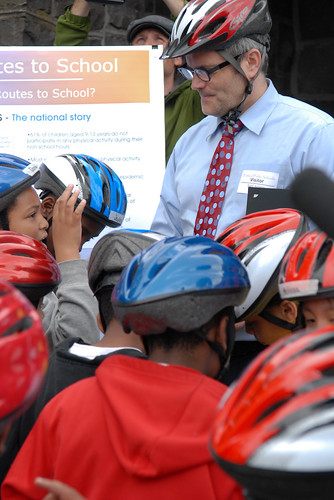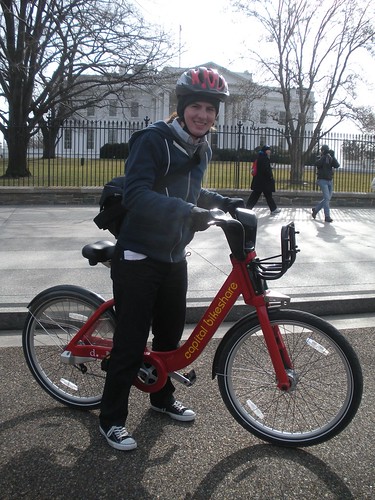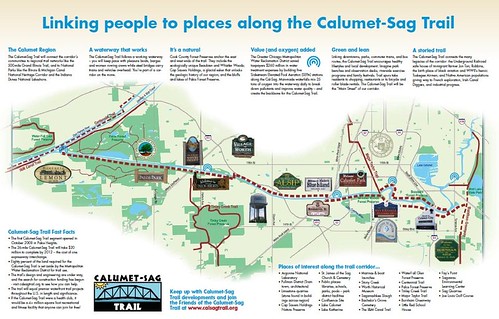1. One of the sometimes bitter "battles" within biking is that there are two different approaches, with vehement advocates on either side. One school and prominent for a long time, is what is called "
vehicular cycling," where bikes are treated as cars and you ride within traffic, mixing up so to speak, with fast and heavy cars and trucks.
I don't know what to call the other camp, but it focuses on creating the right kind of infrastructure--buffered bike lanes, cycletracks, trails, etc.--like how they do it in the best functioning cities for bikes in places like Copenhagen, many places in the Netherlands, Montreal in Quebec, etc. Professor John Pucher of Rutgers University, researcher Anne Lusk at Harvard School of Public Health, Professor Ralph Buehler at Virginia Tech's Alexandria campus are some of the proponents within what we might call the school of bicycle facilities as integrated systems.
I am in the latter camp, because I recognize that many potential riding demographics (women, children, older people, etc.) are less likely to take up biking if they have to mix it up with cars.
A few weeks ago there was a tragic accident in Baltimore where a Johns Hopkins University student riding in a bike lane was critically injured--he is in a coma and he will never recover consciousness--because a driver turned into a driveway across the bike lane, without yielding the right of way to the bicyclist.
I hadn't thought about this specifically in terms of vehicular cycling, but just about any instance when you read the online comments in articles in newspapers that are about biking, the comments are virulently against bicyclists being on the roads. Earlier this week, Michael Dresser commented about this in his
Baltimore Sun column, "
Some cyclists, drivers deserve each other."
Vehicular cycling will never succeed (it has already proven it won't succeed in terms of generating high rates of bicycling take up comparable to cities in Europe) as long as a majority of automobile drivers refuse to "share the road."
While I find more vehicle operators to be more accepting of bicycling than in recent years--I experience far fewer negative incidents than I did even a couple years ago, it almost doesn't even matter if a majority of motor vehicle operators are fine with sharing the road because one vehicle is enough to kill or maim.
(The other reason to favor the other approach is that until you ride on a trail, and maybe in the right kind of separated bike lane, you don't realize how much of your mental energy spent while bicycling is on defensive riding. On trails, you don't have to worry so much about that, even if DC seems to be against posting "rules of the road" signage on the Metropolitan Branch Trail.)
2. Related to this, the State of Maryland passed a vehicular homicide bill, although it treats killing someone with gross negligence as a misdemeanor with little likelihood of jail time--sort of defeating the purpose, that killing someone almost by definition needs to be treated seriously. See "
Bike advocates cheer manslaughter bill's passage" from Michael Dresser's Getting There blog.
 Mayor Adams of Portland at Safe Routes to School ride. Flickr photo from Bike Portland. For all the talk of how former Mayor Fenty was a big supporter of bicycling, in my opinion his interest in biking was personal, related to his interest in triathalons. Yes, he was at the launch of the Capital Bikeshare program, but would he initiate a bike or walk to school effort, and actually go out to a school comparable to what Mayor Adams did? Probably not.
Mayor Adams of Portland at Safe Routes to School ride. Flickr photo from Bike Portland. For all the talk of how former Mayor Fenty was a big supporter of bicycling, in my opinion his interest in biking was personal, related to his interest in triathalons. Yes, he was at the launch of the Capital Bikeshare program, but would he initiate a bike or walk to school effort, and actually go out to a school comparable to what Mayor Adams did? Probably not.4. As I have written in a variety of places, not just here, the type of backlash against bike accommodations that we are seeing in DC, New York City, Toronto, etc., is not unique. It even happens in Portland, Oregon. There is a great interview with Mayor Sam Adams of Portland (who formerly served as Transportation Commission) about biking related issues,
An interview with Portland Mayor Sam Adams, in the Bike Portland blog.
The writer of the piece, Jonathan Maus, calls the reaction "bikelash." From the interview:
Are you aware of the "bikelash" that's going on in New York City?
Yes, and in Toronto they just elected a mayor running against bikes.
Do you think there are lessons for Portland from those places?
Yes, there are. You have to make smart decisions that you can show have a tangible benefit on the cost-benefit scale, that you are saving people's lives and reducing injuries, and your smart transportation advocates need to stay at it. We're not across the finish line. It's a continuous effort. ...
At the BTA Alice Awards last year, you made it clear in your speech that you were getting a lot of negative push-back and you needed more support from the bike advocacy community. Did you get some?
Not a lot [laughs]. But, there are reasons for that unrelated to me. Like, a search for and a new leader at the BTA and a bicycling advocacy community that had had about a decade that lacked any controversy at all. I will tell you, and I was working at City Hall at the time, when Earl was putting through with Mia [Birk] the first bike efforts, it was blisteringly controversial. Nothing like you think 2010 was. It was blisteringly controversial and you just perservere. So, I guess I learned from observing that work of then-Commissioner Earl Blumenauer with Mia Birk.
5. Related to the "bikelash" in New York City, I guess the problem is that the former Commissioner of Transportation, Iris Weinshall, was "let go" by Michael Bloomberg because of his assessment that she wouldn't move fast enough to implement pedestrian, transit, and bicycle related improvements.
The problem is that the fired Ms. Weinshall is very well connected, seeing she is the wife of Senator Charles Schumer. So she has pretty good access to the New York Times, etc.
From an email by Steve Faust on the abpp e-list:
There are a certain number of "power brokers" in NYC who believe that they have a direct line to the Mayor and more, to the reigns of power in the city. In large part, these are people who either drive everywhere themselves, or even more, have limos or paid government drivers and cars standing waiting for them. They don't take transit, they don't look for parking, they don't bike and they don't walk. They are the 19th Century version of the Carriage Trade - people who went everywhere in their private carriages while everyone else walked or took the omnibus. Some of the traffic calming and transit enhancements are interfering with their limos being able to double park with impunity. They are outraged that their behind the scenes words are not being listened to.
Thing turned so ugly over the Prospect Park West barrier bike lane that a law suit was filed against DOT. In the first paragraph, it starts out claiming that there is a great conspiracy going on to inflict this disgrace upon the neighborhood, etc... The reality is that there were 3+ years of local meetings based on the Community Board's request for safety improvements to stop rampant speeding on PPW. ... One of the key sponsors of the PPW lawsuit is Iris Weinshall - who lives on PPW and now has problems with her limo double parking.
Flickr photo of Capital Bikeshare by effelarr.
8. The Metropolitan Branch Trail in DC can become a great example of how regional bikeways serve as foundations for a community bikeways network, linking commercial districts, supermarkets, etc., with civic assets (schools, parks, libraries, etc.), and neighborhoods.
For example, while I think that Harris-Teeter's prices are a bit high for my taste, that isn't the case for their weekly specials. E.g., last week you could buy four pounds of strawberries for $5 or get a free case of bottled water if you tried out and bought that new Mio drink flavoring from Kraft (I think about drink flavorings etc. as opposed to carrying lots of water or soda on my bike, or using a car to grocery shop).
In short, having the Harris-Teeter at 1st and M Streets NE allows me to trip chain--I can stop at the supermarket on my way home from Downtown, before I jump on the Metropolitan Branch Trail to ride the almost five miles home. It means planning to have the right kinds of bags to carry a case of water, but it's the kind of example of how bikeways can be key mobility systems within cities and counties.
Think of producing a map like this for the MBT, showing the various civic assets, shopping districts, etc., along the route, and the same for a regional bikeways network.
9. Related to the MBT is something that I don't think about enough, and that is access issues for the disabled. Last week when I was on the trail, a group of the disabled from some type of facility were out on the trail, walking in a relatively protected fashion, without having to worry about cars, without having to worry how they looked, without having to walk "faster."
Shared use paths (trails) serve many audiences, bicyclists, walkers, people taking their children to school, people walking their dogs, and runners, for transportational and recreational purposes.
Labels: bicycling, bikesharing, change-innovation-transformation, civic engagement, protest and advocacy, transportation planning, urban design/placemaking







0 Comments:
Post a Comment
<< Home